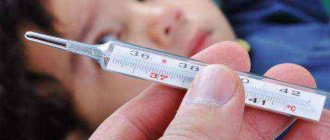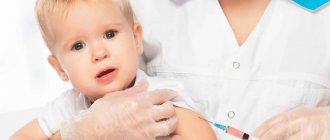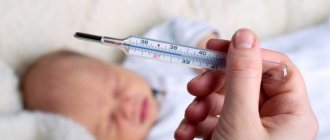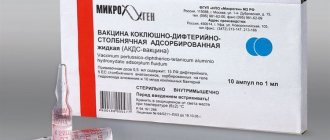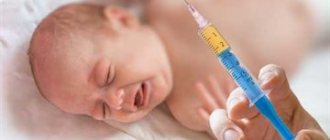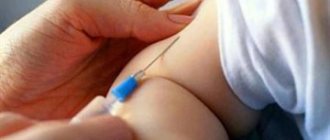As a preventive measure against various viruses and diseases, children are vaccinated from a very early age. After vaccination, many parents try to refrain from water procedures with their child, as there is an opinion that the baby cannot be bathed for at least 48 hours after the procedure. Some doctors confirm this opinion, believing that the child really should not be bathed for 2 days. But more and more pediatricians deny this point of view, arguing that there is no connection between vaccination and the child’s contact with water.
Why are children vaccinated?
A vaccination is an injection to improve the child’s immunity and ability to resist various infections. Along with the vaccine, a very small amount of weakly active bacteria and viruses enters the bloodstream, from which the body must protect itself. The child’s immunity is activated, causing a response to the vaccine, which prevents the development of the disease in the body.
Vaccination calendar for children under 1 year of age (in Russia) - what mothers need to know
Why children should not be bathed after vaccination
There are recommendations from experts that it is better to bathe the baby the day before the proposed vaccination, and then refrain from water procedures for 2-3 days. By such actions they want to protect the child from even the most minimal possibility of contracting any infection.
First of all, you need to be guided by the baby’s condition in order to understand whether he can be bathed or not. If your baby has a fever or simply doesn’t feel well after vaccination, it is better not to bathe him. If the child is vigorous, active and cheerful, then there are no special restrictions for swimming after vaccination.
It is believed that children should not be bathed immediately after vaccination, because the body is weakened and it is believed that there is a risk of infection due to water, since running water is a source of pathogenic microorganisms and is not sufficiently purified (in fact, water does not pose any danger to the baby). It is also believed that you can become hypothermic and catch a cold. Therefore, many parents do not bathe their children for 1.5-2 days after the injection.
At first, the body's defenses are indeed slightly weakened. The amount of antibodies produced is not yet sufficient to actively fight infections entering the body. In the first 24 hours after vaccination, children may develop a fever, sore throat, and cough. Swimming can provoke all these negative consequences due to temperature changes.
Due to the fact that the body is weakened, doctors also recommend limiting exposure to fresh air. Immediately after the injection, the likelihood of becoming infected with airborne viruses or accidentally catching a cold increases.
Bathing a child is contraindicated if there are signs of flu or a cold:
- lethargy;
- runny nose;
- cough;
- elevated temperature;
- general deterioration of health.
After vaccination, some children get sick because the immune system is not yet able to fully fight diseases and needs support. Therefore, if a child gets sick, limit the baby’s interaction with other children, reduce or completely eliminate water procedures (except for hand washing) and limit time outside.
Is it possible to bathe a baby after vaccination?
Research has been conducted on this matter. They showed that contact with water after vaccination does not pose any threat to the child’s health. Moreover, hygiene procedures must be carried out. Therefore, you should not completely protect your baby from the usual water treatments - just monitor his well-being and periodically measure his temperature. If the baby feels fine, you can bathe him absolutely calmly.
If your child has a fever, give him a quarter of an analgin tablet or another drug prescribed by your pediatrician. The same thing is sometimes done even in the absence of fever for preventive purposes. But only on the recommendation of a doctor.
Remember - children should not be given aspirin. It contains acetylsalicylic acid; in addition to its anti-inflammatory effect, this substance reduces blood viscosity, which is harmful for a fragile child’s body.
After what vaccinations can a child be bathed?
There are injections, after which there are no prohibitions regarding bathing the child. These are vaccinations against the following diseases:
- polio;
- rabies;
- flu;
- BCG;
- Pneumococcus;
- yellow fever;
- rubella;
- tetanus;
- whooping cough;
- measles;
- DPT;
- viral hepatitis B;
- hemophilus influenzae;
- mumps;
- diphtheria;
- cholera.
You can’t wet Manta - everyone knows this from school. This doesn't mean you shouldn't wash your hands - just don't get the injection site wet. Sweat is also a liquid, so try to avoid making your child sweat a lot. If the Mantoux sample gets wet, it may increase too much, exceeding the permissible norm (read about the Mantoux test).
After a BCG vaccination, a purulent pimple may appear. This is a normal response of the body to this vaccine, so if you notice such a pimple, do not worry. You can bathe your child after this vaccination.
After a DTP injection, slight swelling, swelling or redness of the skin may appear. There is nothing wrong with this either - such a reaction occurs quite often. You can apply a warm water compress to the area to help the swelling go away faster.
From the forums:
When can you bathe a child after DTP vaccination if there is no fever?
- Yes, at least right away
- only on the day of vaccination you can’t, the next day you can
- The next day you can definitely
Is it possible to bathe a child after polio vaccination?
—Only on the day of vaccination you can’t, if you gave an injection, if droplets then you can
“It’s just important not to steam the injection site, that’s why they say you shouldn’t bathe.” But! If the child tolerates vaccinations normally, then the next day it’s definitely possible
— You definitely shouldn’t bathe on the first day, but you can take a COLD shower for a while. if there is no temperature, she feels normal, it means she tolerates it well. even if the temperature rises slightly for a short time, it’s not scary. but for the sake of your own peace of mind, you can limit yourself to rinsing on the second day)
Is it possible to bathe a child after vaccination against measles, rubella, mumps?
- if there is no temperature, then you can
Moms' opinions on bathing after vaccinations
Most mothers advocate water procedures after vaccinations on the same day or, in extreme cases, the next (to be on the safe side, so to speak), considering them safe for the baby’s health. In reviews on the Internet you can read that many of them do not see any danger in the usual rules of personal hygiene and consider even a slight increase in temperature after an injection to be normal. Moreover, some mothers claim that this is an indicator of the correct reaction of the immune system to the vaccine, which means that the baby’s body is developing correctly.
Video on the topic
More information about DTP vaccination in the video:
Thus, doctors’ opinions differ regarding whether it is possible to wet the puncture area after DTP and swim. Most experts recommend refraining from water procedures for a couple of days. This will avoid post-vaccination complications.
Why can’t you bathe your baby after DTP vaccination, and when can you do it? This question worries inexperienced mothers of first-born babies. The answer is simple: water treatments are prohibited on the first day of vaccination and two days after it. This rule also applies to walking outside.
Doctors' opinion
Many therapists and pediatricians advise refraining from water procedures after vaccinations. But now such advice is given by doctors less and less, since there are no negative consequences for the child’s body from contact with water. If you do not bathe children for too long, avoid hypothermia, and immediately wrap them in a towel after bathing procedures, the risk of catching a cold is very small. Doctors recommend not bathing a child after vaccination in order to further prevent and avoid fever, cough and runny nose.
Dr. Komarovsky believes that if the baby feels well after vaccination, then there is no need to introduce restrictions. You can continue to live as usual, go for walks and swim.
Conclusion: swimming after vaccination does not pose any threat to the baby’s health and swimming is possible. The main thing is the baby’s normal body temperature, just monitor his well-being and avoid hypothermia. By following simple precautions, you can continue to carry out water procedures as usual.
Why can’t you bathe your baby after DTP vaccination, and when can you do it? This question worries inexperienced mothers of first-born babies. The answer is simple: water treatments are prohibited on the first day of vaccination and two days after it. This rule also applies to walking outside.
Baby's well-being
The purpose of vaccination is to develop immunity to a specific type of disease. A certain mass of pathogenic bacteria is introduced into the body, with which the child’s body begins to actively fight. In the first 72 hours after the vaccine is administered, there is a rise in temperature and poor health.
There are three degrees of reaction of the child’s body to the DTP vaccine:
- weak - 37.5C;
- average - 38.5C;
- strong - 38.6C and above.
Some children tolerate vaccination well, but if the thermometer reading is above 38C, it is necessary to offer the baby an antipyretic. Accordingly, if you feel like this, swimming and walking are unacceptable. The baby needs to be provided with peace and rest as much as necessary.
Important! Before vaccination, show the baby to the doctor: he must conduct an examination.
Adverse reactions
DTP vaccinations are the most difficult for children. The child’s body begins to actively produce immune cells to fight the complex virus, which is stressful for the little person. However, an increase in temperature and general lethargy of the child are positive signs: they give a signal that the vaccination has begun to take effect.
What happens to the baby after vaccination, and when is it allowed to swim? There may be redness and swelling on the baby’s body at the injection site. Some babies cry when touching the injection site or moving the handle. By evening the child may:
- temperature rise;
- upset stool;
- go vomit;
- loss of appetite.
These reactions to the vaccine are considered acceptable if they go away on their own after a couple of days. When the baby's normal condition is restored, walks and bathing are allowed.
If your baby’s health does not improve on the third/fourth day, you should call the doctor. You cannot wash a child in this state.
Important! To avoid misunderstandings, do not give your baby new complementary foods these days: you should not introduce unfamiliar foods into the diet. Eliminate new foods a week before your vaccination appointment.
Opinions and prejudices
Is it possible to bathe a baby if she has a weak reaction to the injection? The reason for the ban on washing after vaccination is also a decrease in the baby’s body’s defenses. Energy is spent on the production of antibodies, and the likelihood of picking up viruses from the water supply increases significantly.
You can bathe your baby if you are sure that the water is safe. If the child is feeling well, you can bathe him in boiled water with herbal infusions. How long can a baby take a bath? You shouldn’t keep it in water for a long time, you just need to wash off the sweat.
Many mothers confuse vaccinations against pertussis-tetanus-diphtheria with mantoux. After manta vaccination, it is unacceptable to moisten the injection site, but you can wet the DPT injection site: do not rub it with a washcloth, but simply rinse it with water. The ban on swimming is associated with the risk of catching a cold during water procedures or contracting an infection from raw water.
Bottom line
When can you carry out water procedures with your baby? If the baby is feeling normal, he is allowed to splash in the bath the very next day. If the child has a fever, bathing is prohibited. In conclusion, look at the material on proper care of your baby after vaccination:
Today, medicine gives parents the right to choose: to vaccinate or not to vaccinate their child. Fortunately, the majority are in favor of vaccination, but choose imported vaccines. The degree of tolerability depends on how well the child is prepared for vaccination. It is important to follow all doctor’s recommendations regarding the post-injection period.
Modern parents have the right to agree or refuse vaccinations; it is their responsibility to study information about vaccinations and make the right choice
Actions of parents after vaccination with DPT or Pentaxim
The DTP vaccine is a vaccination against three serious diseases: whooping cough, tetanus and diphtheria. It is this that causes a huge amount of controversy, since it is considered the most reactive. Vaccination is often quite difficult for children to tolerate: the temperature rises, up to 39 degrees, allergic reactions, leg pain and other side effects often occur.
In public clinics, free of charge, the child is given a separate DPT vaccination and is given drops against polio separately. The imported vaccine Pentaxim is designed to protect babies from five diseases at once. These include whooping cough, tetanus, polio, diphtheria and diseases caused by the bacteria Haemophilus influenzae type b. They cause pneumonia and meningitis.
Regardless of the type of injection given, doctors strongly recommend that you follow all of their instructions immediately after vaccination. Especially when it comes to walking and water treatments.
Why can't you go for a walk on the day of vaccination?
From time immemorial, there has been an opinion that it is not recommended to go for a walk after any vaccination. Doctors have different opinions on this matter. Thus, Dr. Komarovsky strongly recommends going out into the fresh air both in summer and winter. Let's consider several points of view on this matter.
Pediatricians say that you can and should go for a walk, but as an insurance policy, it is better to refrain from walking for the first three days after vaccination. At this time, it is better not to go anywhere, to protect your child from communicating with peers.
After vaccination, the body is busy developing immunity against the diseases inoculated into it. There is no need for extra workload and unwanted contacts now. Neglecting these rules can result in a more serious illness. It will not be the vaccine that is to blame, but the mother.
For some time after vaccination with Pentaxim, you cannot attend kindergarten and clubs. In a large group, viruses spread faster, which means a vaccinated baby is much more vulnerable than his friends. If the DTP went without complications, then on the third day you can send the child to a preschool institution.
Walking schedule for a child after DTP
The day after vaccination requires complete abstinence from walking. It is quite possible that a baby, including a newborn, will not have a reaction to the vaccine at all. The ban on walking is due to the fact that a vaccinated child needs to be observed a little. If there is no fever or other side effects, you can go for a walk the next day.
A walk after DTP is carried out in compliance with a special routine:
- Exit in favorable weather: in summer no more than +20 degrees with air humidity 40% or less, in winter up to -10, provided that there is no strong wind outside.
- You can walk for no more than an hour the day after vaccination. The child should not have a fever. Some pediatricians allow the possibility of going out into the fresh air with newborns if the temperature does not rise above 37.5 degrees.
- There is no need to wrap the child up. The baby may sweat, which will negatively affect the injection site. It may become red, slightly swollen and cause discomfort. In addition, there is a risk of artificially raising the baby’s temperature.
- Walks should be calm, with a minimum amount of outdoor games. It is important to avoid playgrounds and refuse to visit shopping centers: all this can provoke unwanted reactions in a newly vaccinated body. It’s also better not to visit at this time.
You can go for a walk after vaccination in both summer and winter, but only if the weather is favorable and the baby is in a good mood
The “weather” in the house is also important. Some time after vaccination, it is necessary to observe the baby, his appetite and mood. The temperature in the rooms should not exceed 22 degrees. It will be good to humidify the air as much as possible. When a child does not want to eat, there is no need to force him. It is better to give more water, compote, fruit juice or other drinks.
Thus, you should not go for a walk immediately after DTP vaccination. It is optimal to go outside after a few days, when the child’s body has recovered and can repel harmful bacteria and viruses as much as possible.
Is it possible to wet the injection site and after how many days is it allowed to bathe the child?
The rules for swimming are quite simple:
- you should not swim on the day of vaccination, as there is a high risk of fever;
- on the second day, if there are no complaints, the child can be washed.
You should not get the injection site wet for 24 hours after the injection. In this regard, any water procedures are contraindicated. If the child is still very young, it is enough to wipe him with wet wipes, avoiding the wound area. You can give your child a full bath already on the second day, provided the baby is feeling well and has no fever.
On the first day after vaccination, it is better not to wet the injection site.
In general, the ban on swimming after vaccination is associated with a careful attitude towards the health of your child. While swimming, it is easy to become hypothermic and get sick, which is extremely undesirable. Here is the answer to the question: “why is it not advisable to bathe a vaccinated person in the first 24 hours?”
Is it possible to bathe a child and walk with him after a polio vaccination?
Normally, the polio vaccine does not cause a reaction. If it was done separately, then there are no restrictions on visiting the street and swimming. The baby feels well, the temperature is normal - you can safely go outside.
In public clinics, it is customary to simultaneously administer the polio vaccine in combination with severe DTP. In this case, a negative reaction may appear specifically to the latest vaccine. The same applies to the case when the baby receives Pentaxim, which includes a complex of 5 weakened bacteria.
Is it allowed to bathe a baby and walk outside after hepatitis vaccination?
The child receives the first vaccination against hepatitis while still in the maternity hospital. The baby is injected with exactly as many weakened viruses as the body can overcome. This is how immunity to hepatitis disease is developed. Revaccination is carried out when the baby is 1 month old.
There are usually no side effects from the hepatitis vaccine, but since every child is different, you should follow the rules of behavior after the hepatitis vaccine.
The child’s body may react differently to the introduction of weakened bacilli: weakness may appear, a low temperature may rise, and the baby will be lethargic and drowsy. Of course, in this case it is better to refuse walks. You should also not bathe on the first day after the vaccine is administered.
Some pediatricians say that in the absence of any signs of illness in the baby, you can bathe and wet the injection site. On the first day, it is better to do this in the shower, and do not rub the wound with a washcloth. After bathing the child, dry with a towel and lightly blot the injection site.
Despite the fact that hepatitis vaccination is quite easily tolerated and gives a reaction in rare cases, children should start walking on the second or third day after vaccination. It is better to avoid places with large crowds of people (playgrounds, shopping centers). Attendance at clubs and sections must be limited for a time.
Walking and swimming are strictly prohibited if:
- the child has a fever and lymph nodes are enlarged;
- rashes appear on the skin, severe itching bothers you;
- The baby complains of nausea.
Fever and poor health of the child after vaccination prohibit walking in the fresh air. Is it possible to walk and wash after vaccination with Prevenar?
Prevenar is a relatively new vaccine aimed at stimulating the immune system to produce antibodies to pneumococcal infection. It causes pneumonia, meningitis, pharyngitis, bronchitis. Vaccination with Prevenar allows you to minimize the risk of contracting these diseases.
The rules of behavior after vaccination with Prevenar do not differ from the rules of behavior after any vaccination. It is possible that parents will choose the reinsurance option and decide to stay at home with the child for a couple of days. This is advisable if the baby has a high fever reaction to the vaccine and general symptoms of malaise. It is important to remember that for children under one and a half years old, a temperature of up to 37 degrees is considered normal, so fresh air in this case will only be beneficial.
Bans on swimming after Prevenar are also not justified. Some doctors explain the ban by the risk of infection by microbes contained in running water through the wound. It has been scientifically proven that this is not the case. After vaccination, children can and should wash themselves, carefully avoiding the injection site.
Every mother, from the moment her child is born, cares about his health and well-being. The woman’s main assistant in this matter is the pediatrician. Doctors of this specialization conduct periodic examinations, record readings and identify abnormalities.
Giving your child vaccinations is a factor that prevents the development of many fatal diseases. Often, experts do not give precise recommendations and explanations on how to care for the baby subsequently, in particular, how and how much to bathe. They warn against swimming without explaining why. Often mothers are interested in whether it is possible to wash after vaccination for a child who has difficulty falling asleep without evening water procedures?
Baby's well-being
The purpose of vaccination is to develop immunity to a specific type of disease. A certain mass of pathogenic bacteria is introduced into the body, with which the child’s body begins to actively fight. In the first 72 hours after the vaccine is administered, there is a rise in temperature and poor health. There are three degrees of reaction of the child’s body to the DTP vaccine:
- weak - 37.5C;
- average - 38.5C;
- strong - 38.6C and above.
Some children tolerate vaccination well, but if the thermometer reading is above 38C, it is necessary to offer the baby an antipyretic. Accordingly, if you feel like this, swimming and walking are unacceptable. The baby needs to be provided with peace and rest as much as necessary.
Important! Before vaccination, show the baby to the doctor: he must conduct an examination.
What is DTP vaccination?
DTP is an adsorbed pertussis-diphtheria-tetanus toxoid that can cause the production of antibodies to the original toxin. It is administered intramuscularly to children from three months of age to prevent the following diseases:
- Tetanus.
- Whooping cough.
- Diphtheria.
The vaccine stays in the muscle for a long time, which provokes the body to periodically produce antibodies to these diseases. Gradually, the child’s immunity increases, and the ability to resist these diseases increases. This happens due to the fact that very few weak pathogens enter the body, which the child’s immunity is already ready to cope with. It is activated, produces antibodies and creates a “cellular memory” that is triggered when a real infection occurs.
Don't be intimidated by the multitasking nature of this vaccine. It is quite complex and heavy, but the compatibility of its components is perfectly chosen.
Together with DTP, you can be vaccinated against polio and hepatitis B.
The injection is given in several stages:
- At 3 months.
- At 4.5 months.
- At 6 months.
- At 18 months.
After the injection at 18 months, courses are repeated at 6 and 14 years and then every ten years.
How to prepare for vaccination?
The mother can find out the child’s vaccination schedule from the local pediatrician and prepare for it in advance - take blood and urine tests, perform an ultrasound of the brain (you need to show the results to a pediatric neurologist to get permission (or prohibition) for vaccination).
A week before vaccination, you need to limit your baby from communicating with strangers and sick people so that he is absolutely healthy before the appointment. 3 days before vaccination, you need to start giving histamines - they will smooth out possible allergies to the administration of DTP. Which remedy is better? Experts recommend Fenistil or Zyrtec. Is it possible to take Suprastin? This drug is not recommended to be given, as it dries out the mucous membrane, and because of this, the protective function of the upper respiratory tract is disrupted; the mucus does not retain or remove microbes.
Doctors do not prohibit washing children the day before vaccination, so it is better to bathe the baby the night before.
Useful tips
On the day before the vaccine, the child can be given an enema and not allowed to drink or eat much. Taking Fenistil should be continued on this day and for another 3 days after the injection. Before, during and after vaccination, it is not recommended to introduce new foods into complementary foods or give new medications.
Arriving home, without waiting for the temperature to rise, you can give your child an antipyretic with an analgesic effect (Nurofen, Nimesulide, 1/4 tablet of analgin). If the temperature still rises and lasts more than two days, you should consult a doctor.
Parents themselves will understand whether the child can swim after vaccination based on the baby’s condition. But many doctors clarify to mothers that in the first couple of days the body’s defenses are weakened, and it is better to refrain from bathing.
Why is swimming prohibited?
Vaccination is prescribed to a child only if he is absolutely healthy. As a result of the introduction of crumbs of weakened pathogens into the body, the immune system begins to intensively fight them, and it does not have the ability to resist other infections. One of the reasons why swimming after vaccination is prohibited is the risk of infection of the baby through dirty water. Therefore, if parents decide to carry out water procedures, the water must be purified and warm enough so that the child does not catch a cold.
Other reasons why it is better to wait a few days to swim:
- Unpurified water makes the child sometimes want to scratch the injection site, but this is absolutely forbidden to do so in order to prevent foreign microorganisms from getting there. Therefore, children almost never bathe for the first 2 days after vaccination.
- When your baby takes a long, warm bath, he may overheat and his nervous system will become overstimulated. All this is additional, unnecessary stress for the body. Night sleep may be disrupted, the temperature may rise, and anxiety may increase.
- At the same time, pediatricians provide for the option that the reaction to the vaccine will not appear immediately, but within the first two days. If you have a fever and general deterioration in health, you should not swim until you recover.
Sometimes at an appointment the mother asks the pediatrician: “In my case, there is no reaction to DTP, and the temperature does not rise. Why do vaccinations affect my child differently? Experts explain that at each age a baby can react differently to the same vaccine. If at 3 months the child endures it without a strong increase in temperature and the doctors said: “swim without fear,” then at 1.5 years the child’s body temperature can rise above 380C, and at this temperature they no longer bathe. It depends on the individual characteristics of the organism.
The only strict prohibition is swimming in public natural and artificial reservoirs (swimming pool, pond, river, lake, water park, sea), as the risk of infection is too high.
Is it allowed to bathe a baby and walk outside after hepatitis vaccination?
The child receives the first vaccination against hepatitis while still in the maternity hospital. The baby is injected with exactly as many weakened viruses as the body can overcome. This is how immunity to hepatitis disease is developed. Revaccination is carried out when the baby is 1 month old.
The child’s body may react differently to the introduction of weakened bacilli: weakness may appear, a low temperature may rise, and the baby will be lethargic and drowsy. Of course, in this case it is better to refuse walks. You should also not bathe on the first day after the vaccine is administered.
Some pediatricians say that in the absence of any signs of illness in the baby, you can bathe and wet the injection site. On the first day, it is better to do this in the shower, and do not rub the wound with a washcloth. After bathing the child, dry with a towel and lightly blot the injection site.
When should you not swim?
Is it possible to swim after vaccination if the child’s reaction to it is ambiguous? There is only one answer: you can’t. Outwardly, the reaction may not appear at all, or it may be severe and prolonged. Based on the degree of manifestation, there are 3 types:
- Up to 37.5 C – a type of weak reaction.
- At a temperature of 38.5 C, this is the average severity of the reaction.
- From 38.6 C and above – a strong type of reaction.
In any case, if the temperature rises after vaccination, it is better to postpone water procedures. From the mark on the thermometer at 38 C, the baby should be given a mild antipyretic (in the form of syrup or rectal suppositories) that does not contain acetylsalicylic acid, which reduces blood viscosity.
How will the baby react to DPT?
An increase in temperature is a natural reaction of the body, indicating the effect of the injection. Redness and swelling may appear at the injection site, and sometimes pain is felt when touched. At the same time, the following may be noted:
- Stool disorder.
- Vomit.
- Nasal congestion.
- Apathy.
- Cough.
- A sore throat.
- Loss of appetite.
Symptoms should subside in about 2 days. Doctors allow swimming when the baby’s health returns to normal. If after two days the temperature does not subside and the alarming symptoms do not go away, you should not take a bath or shower. After taking a bath, a child can catch a severe cold.
Immediately after vaccination, it is recommended not to leave the clinic for half an hour. The child may experience immediate reactions to the vaccine and develop anaphylactic shock. In this case, doctors will be able to quickly provide him with the necessary medical care.
To avoid possible infection from sick children who came to the clinic, it is better to take a walk outside during this time, away from people. If the child behaves calmly, you can go home.
Why can’t you bathe a child when a tumor appears at the vaccination site and his leg turns red? This is not a standard reaction to vaccination and you need to wait a little until the baby’s health returns to normal. At the same time, you should not make compresses with alcohol for your baby - it is better to lubricate the swelling with Troxevasin. The ointment stimulates blood circulation and quickly relieves swelling.
Adverse reactions
DTP vaccinations are the most difficult for children. The child’s body begins to actively produce immune cells to fight the complex virus, which is stressful for the little person. However, an increase in temperature and general lethargy of the child are positive signs: they give a signal that the vaccination has begun to take effect.
What happens to the baby after vaccination, and when is it allowed to swim? There may be redness and swelling on the baby’s body at the injection site. Some babies cry when touching the injection site or moving the handle. By evening the child may:
- temperature rise;
- upset stool;
- go vomit;
- loss of appetite.
These reactions to the vaccine are considered acceptable if they go away on their own after a couple of days. When the baby's normal condition is restored, walks and bathing are allowed.
If your baby’s health does not improve on the third/fourth day, you should call the doctor. You cannot wash a child in this state.
Important! To avoid misunderstandings, do not give your baby new complementary foods these days: you should not introduce unfamiliar foods into the diet. Eliminate new foods a week before your vaccination appointment.
When can you swim?
Hygiene occupies an important place in the life of every person, especially the youngest. The baby can bathe when DTP does not cause strong reactions in the body. To do this, you need to carefully monitor the child, measuring his temperature and monitoring his general condition. Parents usually see how the child feels, and if he is cheerful and active, he can take a bath the very next day.
When swimming, in order to avoid negative consequences, you must follow some rules:
- The water in the bath should be purified, ideally boiled.
- Many parents add infusions of soothing or disinfecting plants (chamomile, oak bark, a few drops of lavender) to the bath.
- The water temperature should not be too cold or too hot - ideally between 36 and 39 degrees, so that the baby does not get cold or overheat.
- It is necessary to limit the time the baby spends in the bath.
- After the bath, the baby should be carefully dried with a towel, avoiding rubbing the vaccination site.
Water procedures are beneficial for children, and if parents are in doubt when it is possible to bathe a child and when not, then they should know that children can always be bathed, except in rare cases. If the baby is not bothered by poor health, proper bathing cannot harm.
If children are accustomed to daily bathing, then you can replace baths with rubdowns or showers. The water itself cannot harm the child or have any effect on the vaccination. The main thing is that it is clean, the injection site is not scratched, and the children wash with pleasure.
Opinions and prejudices
Is it possible to bathe a baby if she has a weak reaction to the injection? The reason for the ban on washing after vaccination is also a decrease in the baby’s body’s defenses. Energy is spent on the production of antibodies, and the likelihood of picking up viruses from the water supply increases significantly.
You can bathe your baby if you are sure that the water is safe. If the child is feeling well, you can bathe him in boiled water with herbal infusions. How long can a baby take a bath? You shouldn’t keep it in water for a long time, you just need to wash off the sweat.
Many mothers confuse vaccinations against pertussis-tetanus-diphtheria with mantoux. After manta vaccination, it is unacceptable to moisten the injection site, but you can wet the DPT injection site: do not rub it with a washcloth, but simply rinse it with water. The ban on swimming is associated with the risk of catching a cold during water procedures or contracting an infection from raw water.
When can you carry out water procedures with your baby? If the baby is feeling normal, he is allowed to splash in the bath the very next day. If the child has a fever, bathing is prohibited. In conclusion, look at the material on proper care of your baby after vaccination:
Today, medicine gives parents the right to choose: to vaccinate or not to vaccinate their child. Fortunately, the majority are in favor of vaccination, but choose imported vaccines. The degree of tolerability depends on how well the child is prepared for vaccination. It is important to follow all doctor’s recommendations regarding the post-injection period.
